Big Red Book
Celebrating television's This Is Your Life
24 March 1956
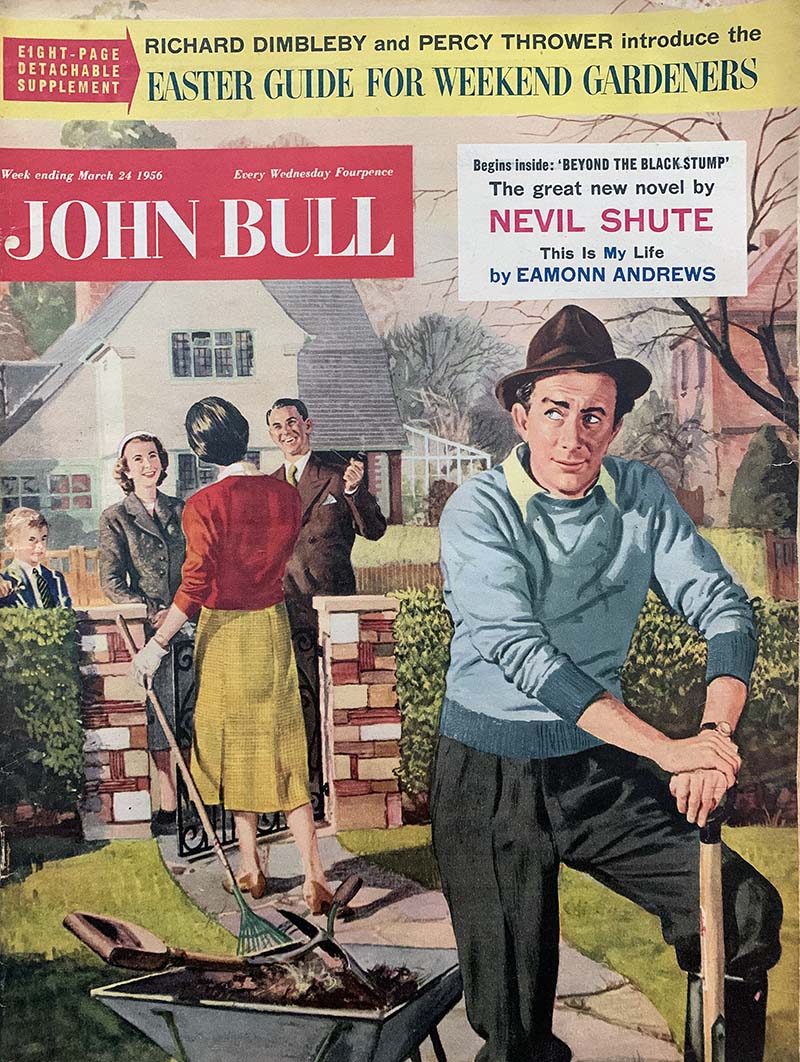
a brief biography
The Legend That Was Eamonn Andrews
a celebration to mark the presenter's centenary year
first-hand recollections
the man who created it all
Eamonn's first appearance as a subject of This Is Your Life
I gamble on three jobs at once
by EAMONN ANDREWS as told to Wilfred Greatorex
As an insurance man, actor and broadcaster, I was living on a tightrope: every slip brought trouble
Even before the fight started that Friday night in 1941, I was in trouble. As I clambered through the ropes in the National Stadium, Dublin, for the middleweight semi-final of the All-Ireland Junior Boxing Championships, I was too preoccupied even to run the rule over my opponent in the other corner.
I was nineteen and, like most young men in the first flush of career-building, I was prone to crisis of my own making. Leading a tightrope existence between the work I was paid to do as an insurance clerk and the work I enjoyed doing in the theatre and, more particularly, broadcasting, I was taking on too much for my own good and for the satisfaction of those above me at the Hibernian Insurance Co.
Often, my job and my real interests clashed, and landed me on the plush carpet of the general manager's office to explain away my shortcomings. Normally, I managed to talk myself out of trouble as it arose - but it was luck I needed now more than blarney.
Both as a senior schoolboy, then as an insurance tyro, I had pestered Radio Eireann for the chance to commentate on boxing. Finally, they had let me in, and though fight broadcasts were few and far between, I was getting them - at two guineas a time. I had already contracted to cover the All-Ireland Junior Championships when, as a committee member, I went to a meeting of the St Andrew's Boxing Club, where I learned to defend myself - and found myself the centre of a problem. We had no middleweight entrant.
The faces round the table turned towards me. I had cut down my boxing to preserve an unmarked and businesslike appearance for my job as welcoming factotum at the Hibernian office.
"What about it, Eamonn?" someone asked.
"Well, I..."
"Fine, you're in."
As there seemed little prospect that I would survive the eliminating bouts in the days preceding the Friday semi-finals and finals, I was not unduly perturbed. To the surprise of my club colleagues, however, and to my own embarrassment, I did get through - and now here was I, sitting on a stool in the ring a quarter of an hour before I was due on the air with my commentary.
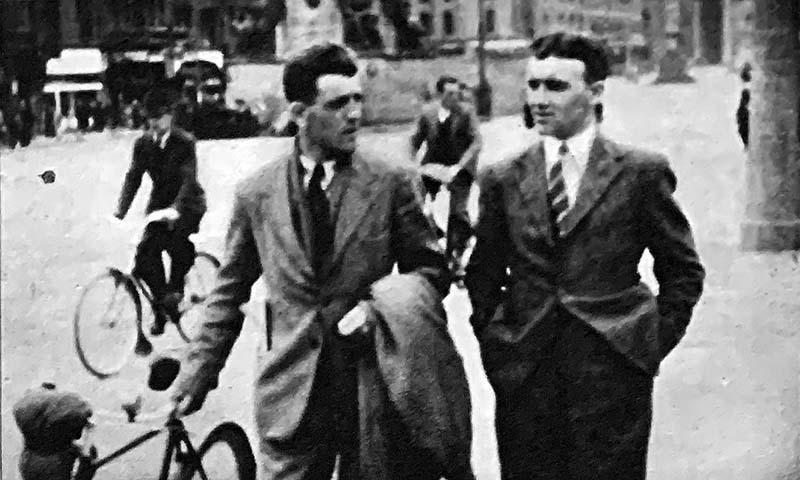
Trying to reassure me, my second - a jovial, chubby-faced, long-standing friend called Hedy Nolan - thrust his wrist watch under my nose: vaguely, I registered that I had more time than I thought. What I didn't know until afterwards was that he had put back his watch. Just about this time, the Radio Eirann engineer up in the broadcasting box was frantically telephoning the studios with the news that the commentator had not turned up.
Perhaps it was because I had no anxieties about the outcome of the fight that I won it. No sooner had the decision been given than I ducked through the ropes and hared through the aisles and up the stairs.
The engineer was thunderstruck when I charged in, a commentator breathless before he began and wearing ring vest and trunks. There were forty seconds to go. My lungs were still doing overtime as I opened the commentary, and it was some minutes before I could settle down.
As I described the cruiserweight fight that followed my own, Hedy tiptoed into the box, towelled me down and tried to pull on my trousers. I wriggled my legs to help him, hoping that the effort would not show in my voice. Somehow, those forty-five minutes came to an end, and I went to the dressing-room to prepare for my final. I got the decision in that, too; but the thrill of it was gone. I was anxious rather than exhilarated, convinced that this night's work must mean the end of the road for me as a commentator.
I worried over it that night at home at Fairbrother's Fields, and next morning, at the tiny desk in front of the underwriterS and policy writers, I awaited the signal from a friend that would indicate that there was a call for me in the quiet office that I had arranged to use for private telephone conversations. None came. Presently, my fears so consumed me that I slipped out and put through a call myself. The voice at the other end was polite but firm. "It was a stupid thing to do," it said. Then: "Don't let it happen again. Next time, keep out of the ring." The hint that there was to be a next time was all I wanted to hear.
My outside interests encroached more and more on office time. In our last year at school, a number of us had formed a drama group called Blue-White Productions, and we had kept it alive. Now it was decided to put on a play that I had been hatching for years, The Moon Is Black, about a man on the dole who goes about speaking poetry and whose beautiful wife is dying from a serious illness. He decided to kill her to preserve her beauty. For the part of this tortured man we had enrolled a young actor from the National university named Noel de Chenu.
It was just twelve days before the opening that Noel came perplexedly into the Hibernian front office. I greeted him formally as if he were a client. Leaning close over the desk so that the other clerks would not hear that it was not insurance we were discussing but a play, he explained that the provost had warned him that his acting was interrupting his studies. "If I play the part," he said, "I'll probably be hoofed out of the university."
Reluctantly, I saw his point. It meant taking the part myself.
My father, who had just come through recurring bouts of illness, was producing the show. We tried to keep what we were doing a secret from the rest of the family, but in such a small house this is impossible: our nightly rehearsals in the front parlour must have been obvious to everyone.
The modern tendency to throw lines away would infuriate my father, and he would demonstrate how I should put it across. Constantly he would say: "Declaim it! I can't hear what you're saying."
Already, I had established beyond reasonable doubt that I was no actor, and there was the further complication that I was now known as an amateur boxing champion more than anything.
Sure enough, the critics took the play apart, and one remarked on "this hunk of manhood trying to be a poetry-spouting neurotic." Another wiseacre noted that everyone had to get the measles out of his system sometime, and that as I had shed mine in The Moon Is Black I might now be expected to write a decent play.
These observations stung, but I was too involved in the problems associated with my insurance job and with my efforts to break into other fields of broadcasting to worry about them very much.
The radio bug had bitten deep, and I was hounding the drama and variety departments of Radio Eireann, pushing myself as an actor and foisting on them my ideas for quizzes and radio parlour games. Nothing worth while came from this salesmanship. I did get one or two single-line parts to say, but when I suggested bigger roles it was always pointed out that these entailed attending rehearsals in mid-afternoon. While this may have been a polite way of brushing me off, I saw it only as evidence that my job with the Hibernian was getting seriously in the way.
I loathed the work - and filing most of all. Daily I would wade through files in the cold basement strong-room to turn up papers needed to amend policies, and every morning the traffic would be the other way, distributing files back into their pigeonholes. This was murder - murder in the dungeon.
One morning I had put several files away when it occurred to me that I was the only person in the strong-room. I lit a cigarette, sat back, and noticed the rows of still unused boxes and pigeonholes at the far end of the room. I chose the one farthest away from the sections in use, and therefore the least likely to come into operation, for some time at any rate, and dumped the rest of the files there. When I got back upstairs a senior clerk asked, "Filing done?"
I nodded a lie.
Next day, I was given another thick batch of files to store away. Some I filed, and some I didn't. I added to my secret stockpile, and had a smoke.
This filing without tears was bound to have its consequences, and one day a clerk unavailingly sought a file and then reported it missing. I overheard him, and quietly slipped down to the dump. I turned up the missing documents and took them upstairs, handing them over to the puzzled clerk with the explanation, "I remember putting them in the wrong place."
In the days that followed, it so happened that I was able to discover more files that others could not trace. If I was fooling some of the people all of the time, I certainly wasn't taking in my immediate superior, an efficient, pipe-smoking official called John Callaghan. After noting that the report of a file's disappearance was invariably followed by my temporary absence, he went to the strong-room himself and, searching around, found "the body".
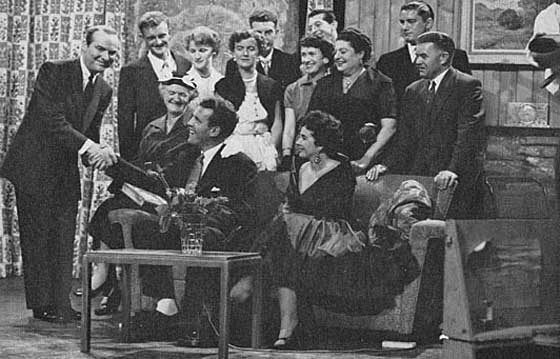
I was coming to know the general manager's office as well as our own front parlour, but when I was summoned shortly afterwards I gave in to nerves I had not known even in those jittery moments before my first fight broadcast. My hands trembled, and my stomach was a jelly. I was kept waiting in the outer office fully ten minutes before the general manager's secretary appeared and said: "Come through, Mr Andrews."
The general manager was a medium-sized man, but he looked like a giant sitting in judgment at the far end of a royal mile of thick-piled carpet. He regarded me for a moment over his spectacles. I was really shaking now, and wondering what my mother and father would have to say if I went home with the news that I had been fired.
"Sit down, Andrews. I've kept you waiting because I've been trying to make up my mind whether you are just lazy - or dishonest." He paused. "Fortunately for you I've decided that you're just lazy, and I will not sack you. But don't let it happen again. That's all." I got up to go, then he added: "You'll come back every night until all those files are straightened out." I did. The job didn't take as long as I expected because another junior clerk who had also been dumping files, though not on my gigantic scale, was seized with remorse and came in to help me.
This was only one of several one-sided brushes I had with the general manager, and familiarity didn't lesson the awe in which I held him. I stumbled from crisis to crisis. The mixture of studies with the Dublin University external department and those connected with insurance examinations, boxing training, occasional broadcasts, and the uncomfortable office job began to take its toll. For some days I had felt a little off-colour and one Thursday afternoon when I was going back to the office from lunch I felt dizzy and sick in the bus. I made my way to the doctor, and he ordered me to bed. While he did not say as much, I gathered it was some sort of nervous breakdown, and he told me to cut down on the things I was doing. For about three weeks after that, I eased up, and dropped the boxing training entirely.
The enforced inactivity gave me the chance to think things out more clearly. I was making hardly any headway in broadcasting, yet I knew that I could not continue insurance work indefinitely. My schoolboys' article on boxing training for the Evening Herald, and the fact that I had another published about Primo Carnera mainly from jottings made over the years, encouraged me to think I might make a go of journalism. I called on Billy Murphy, a rugged Dubliner who was sports editor of the Herald, and he offered to let me accompanying him to a Gaelic football match. He would do the report for publication, and I would write a test piece.
Though I had played the game occasionally at school, without distinction, I knew little about it and had the greatest difficulty in knowing who was scoring. My enthusiasm was for soccer, and between this and Gaelic football is a great divide.
It is no wonder that many people outside Ireland regard the Irish as hard to understand. Nowhere in the world is there a country with so many separationist organisations, and once a man senses this fact, he is halfway to understanding the character of the people. In Irish sport, there were deviationists long before the word came to have its present meaning: even today, it is tacitly understood that a member of the Gaelic Athletic Association should have nothing to do with soccer - a legacy of the long struggle for independence. This makes it rather embarrassing for a president of the Republic who may be a member of the G.A.A. to attend in his official capacity an international soccer match.
As a soccer man, I was soon left behind by the Gaelic version on which I was to do my test piece. Murphy was plainly disappointed, yet soon afterwards he gave me another chance when the cricket season opened. I was to do a running report for the evening editions on the Phoenix Club's opening game, followed by a longer piece for the Sunday paper the following day. If I felt like calling for help on Gaelic football, I was submerged and beyond rescue on cricket. Murphy, sensing my lack of assurance, asked: "You feel you can do it, lad?"
"Sure," I said.
For the evening edition, I got the names of batsmen and bowlers, added five lines on the weather, and sent the copy away by runner. As the afternoon wore on, the whole thing seemed unending and pointless and I left at teatime. Later, I telephoned the club pavilion from town and was given further names and scores. From these, I did the Sunday paper story.
Something told me it would be to my social and physical advantage to avoid Murphy, but with the eager impertinence of youth I called on him during my Monday lunch break. He was rather surprised to see me. After about five seconds I felt he was having to exercise a good deal of self control to keep his hands off me. Livid as he was, he managed to point out quite analytically that apart from the fact that my work as a whole was dire, I had named amateurs without their initials - an unpardonable thing - and completely ignored the bowling averages. Until that moment, I didn't know there were such things. I left Murphy's office in a hurry.
This was not the only setback. Some ideas for what, in all innocence, I considered to be potentially world-beating radio programmes came back from Radio Eireann unwanted. As there were no more than four or five broadcasts a year, it is not surprising that I appeared to be making most headway in an unexpected direction - the insurance business. I had scraped through the first two professional examinations, and one morning the fire manager informed me that I was to be promoted as an assistant surveyor, which meant that I had to assess fire risks in homes, factories and offices.
My first job was at the Hydro Hotel County Clare. I made notes of the materials used in the building, its accessibility and communications, and produced plans and maps showing the location of the premises and their design. I preferred the work because it allowed me more freedom. I could call at Radio Eireann personally, and sometimes there was an opportunity to work out radio ideas in cafes.
There was now no need for the furtive telephone calls in which I had been aided and abetted by the Hibernian's relief operator, a petite, auburn-haired girl named Maire Gannon. Maire would let me make my private calls, many of them to Hedy Nolan, during her lunch hour duty.
Going to the switchroom one day I asked Maire to get Hedy for me. "Oh, he's on the line already," she replied. This happened again and again. I wasn't surprised some time later when they announced that they were to be married.
In the evenings at home I was still writing poetry. At this time, a highbrow literary magazine, The Bell, was a big attraction for the group of intending writers, dramatists and actors with whom I had linked up at school. We continued to meet, and The Bell had a tremendous attraction for me. Many a time I thought it would be the greatest thing in the world to break into it, and when a new editor named Harry Craig took over I really serenaded him. Finally he agreed to let me try an article. I aimed to produce a really great work in miniature, full of romance and idealism, but it was boxing Craig wanted me to write about. I interviewed just about everyone in the game, and produced a six thousand words review of the Irish Amateur Boxing Association. It needed reshaping, but it was published - unfortunately in the last issue before the magazine went under. The ten guineas I was expecting didn't materialise.
The lesson, however, was clear. If even a literary editor associated me with boxing, then others might be even more ready to do so; perhaps there might be a boxing column in it somewhere. There was one considerable snag. On the nights when there was no commentary, I was finding it difficult to get past the doormen at the National Stadium. This was partially solved by using the boxers' entrance whether there was a commentary or not and so making my face familiar to the doorman, but it did not always work. Where the professional shows were promoted, I was completely unknown. I could not afford the ringside seats which alone would give me as close a view as I needed, so I became a steward, selling programmes and showing people to their places. When the bell sounded, I could stalk in a kneeling position as near to the ring as possible.
Later, finding even this position too remote to know what was really going on, I became a second to the boxers. This, too, had its limitations, and it was while walking through Woolworth's one lunchtime that I got the best idea. At one counter they were selling printed-while-you-wait business cards. I ordered a set bearing the words:
Radio Eireann Boxing Commentator
We didn't run to a phone at home, so I had the firm's number put in. I knew all too well that neither Radio Eireann nor the Hibernian were likely to approve of such enterprise. What mattered, though, was that it worked.
I used the card for the first time to get into the National Stadium. The doorman hesitated for a moment, then nodded me inside. Another time, it got me into Dalymount Park for a heavyweight fight in which Jack Doyle was engaged. I desperately wanted to interview Doyle and when the fight was over, I made for his dressing-room. It was guarded by two massive characters at least as big as Doyle himself. I began to lose my nerve, and diffidently waved the card in their faces. One of them opened the door reluctantly, then pushed me inside.
There, Doyle was lying flat out on the massage table with Movita, his trim, dark-haired wife, feeding him something from a bottle. Suddenly, I felt it was no place to be, and I was beginning to worry how to get out when Movita moved aside and Doyle took my card. He looked very tired. "Tell your listeners..." he began. I wasn't even listening myself: those beefy guards were on my mind.
"Sure," I said. It was a relief to leave.
Whenever I used one of my cards, I always made sure of getting it back. If one got out of my hands, there would almost certainly be hell to pay. I kept them all, until they were so tatty and fingersoiled that I couldn't bring myself to present them.
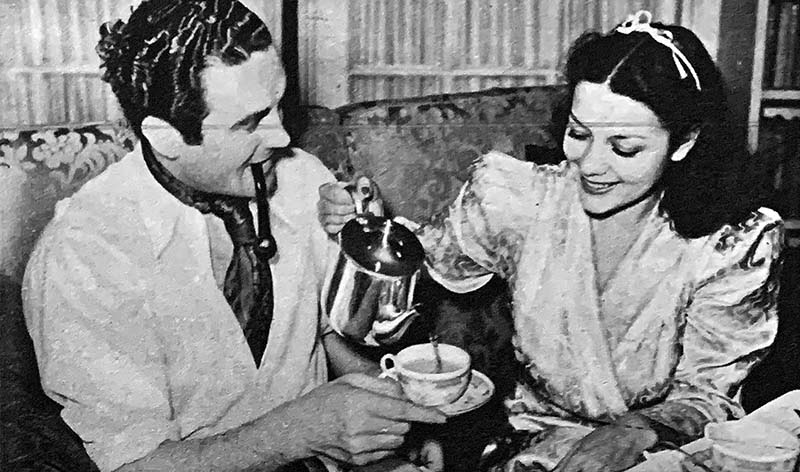
I was now beginning to feel perfectly at ease during fight commentaries, except in those first few warming-up minutes, and in an effort to improve my introductions I decided one day to write some of the descriptive material in advance conveying the atmosphere: the crowd scenes, the haze of cigar smoke, the smells. But even as I began reading it over the air I knew it was a failure. It was flowery, full of purple patches, and for the first time I realised that in commentary work a script falls far short of ad libbing. It was phoney, and the microphone gave it away.
Nobody at Radio Eireann remarked on it, however, and a few days later I was invited to do a test for racing commentators. Although I had not seen more than two horse races in my life, it seemed a great chance to break new ground. I spoke to a friend who knew all about the game and he briefed me thoroughly. I acquainted myself with the jockeys' colours and, as I took my place in the stand, I could not see how anyone could go wrong: there were only so many horses and one had to win.
Another commentator being tried out that day at Baldoyle Racecourse was Michael O'Hehir, who has since become brilliant at the job, sharing the microphone at Grand Nationals with Raymond Glendenning. He can spot a horse with his eyes closed. I didn't see Michael that afternoon: we did staggered commentaries on a closed circuit to the studio.
My test began, and I knew that despite my swotting of the colours I would be safer relying on the numbers on the horses' flanks. It was a mile and two furlongs race, with thirteen starters, and I was lost from the "off." The high wind caught the saddlecloths and flapped the numbers about so much that I could rarely make them out. Nevertheless, I whipped up the commentary to make it sound exciting.
As the horses rounded the far bend, I found that the cumbersome field glasses got in the way. I put them aside. I would have to bluff out the race, at least until they came into the straight in front of the stand. I was still whipping it up and saying "Kildare is in front and The Ivy is dropping back" when a tweedy ruddy-cheeked spectator just below me suddenly turned around, unable to stand any more of it, and bellowed: "Don't be a bloody fool. Kildare is last and The Ivy is second last." With a lip microphone which censors extraneous sound I might have got away with it, but the open "mike" I was using carried this spontaneous correction right back to the studio.
I gave the tweedy man a dirty look, and retired hurt. It was a sort of mutual kindness ever after that the producer and I never mentioned the incident.
Despite this failure, other outside broadcasting jobs came my way, including soccer commentaries, and now that the lessons of my earlier experiences in sports reporting had registered, I took it up again, this time with the Irish Times. Mostly, it was hockey and hurling I covered for them - at seven shillings and sixpence a report.
Even the Baldoyle race commentary fiasco had its compensation: through the audition, I met some of the racecourse officials and they gave me the job of calling out the runners over the course loudspeakers. It meant three guineas for an afternoon's work, paid in cash. On the first day, I had a flutter on the opening race and when my horse came in second to last I tried again. By the time I was through, the bookmakers had my three guineas. Unfortunately, I didn't learn from this experience and never a day's work at Baldoyle was done without my losing every penny I had earned.
The radio work came in steadily: there were short story readings now - a development that must have surprised those who had tried to drum elocution into me - and I was offered the commentary on the Ireland v England soccer international at Dalymount Park in Dublin. It was a midweek game, and the entire ninety minutes were to be broadcast. On the Thursday before the game, a colleague called Brian Durnin, who was to do the summaries, telephoned suggesting that we might visit Belfast on the Saturday to get acquainted with the English players who had a match there before coming to Dublin.
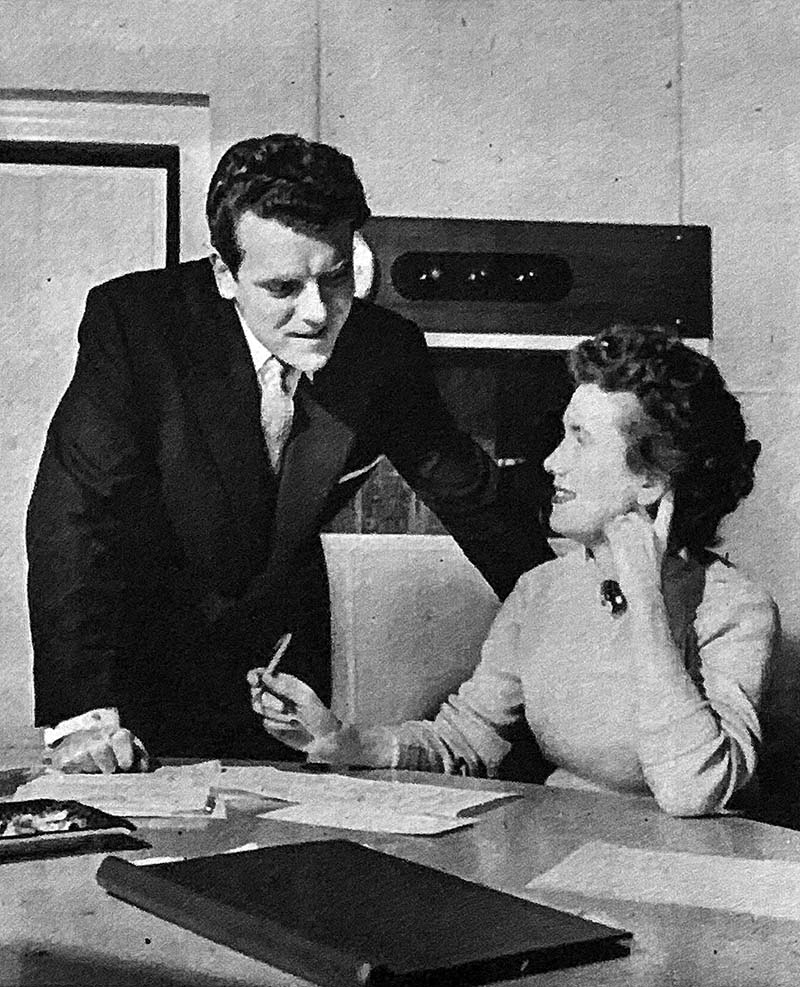
It was a good idea - I had never even seen the England team - but I knew that I would not be permitted to take the Saturday morning off for the trip north: already I had been excused the following Tuesday afternoon for the commentary. I therefore told Durnin it was out of the question, but that night at home the problem was still on my mind and I asked my sister to telephone the office on the Saturday morning to say that I was ill. Kathleen was against it, but finally she agreed. I let Durnin know that I would be joining him.
Everything ran smoothly in Belfast and right through until the interval of the Tuesday game. I rounded off the commentary and Brian took over with his summary. To my dismay, he began: "I don't think England are playing as well as they did when we saw them on Saturday, do you, Eamonn?" Next morning, I awaited the inevitable summons from on high. At about ten thirty, the general manager sent his invitation. Guilt written all over me, I traipsed across that carpet once more, and the lush pile seemed more like broken glass.
He put down the telephone as I approached and said: "I was listening to the broadcast yesterday, Andrews. What was all this about your being in Belfast on Saturday?"
"Oh, that!" I said, trying to appear unconcerned. "We did it to give some authority to the broadcast."
"You were ill on Saturday?"
"I was," I replied.
I knew that he didn't believe me, but I was in so deep now that any bluff seemed better than none.
In the days that followed, I realised that one lie only led to another in this strangely unbalanced life I was leading. The insurance company could not be expected to put up with my irresponsible behaviour much longer. More energetically now, I pursued work in journalism and broadcasting. At home, I threw out a few hints about dropping insurance and setting up as a freelance journalist and broadcaster.
My father, who had never lost a day's work in his life except through illness, pointed out firmly the insecurity of the life that attracted me so much, and my mother was sure that I was too young to know what I was talking about. I was twenty-three, restless and unsettled.
Full of uncertainty, I stayed in the insurance job, hoping that some substantial and lasting work would come my way from Radio Eireann. Then one autumn day in 1945, I had another interview with the drama director about a play part. Again, he explained that it would involve afternoon rehearsals. Could I attend them? When I left, I walked through the town to the O'Connell Bridge over the Liffey, trying anxiously to make up my mind.
My father was working late, and I waited until he got home before announcing that in the morning I intended to resign from the Hibernian.
"Sure you know what you're doing, son?" he asked. I assured him that my mind was made up.
"All right. If you're resigning, you're resigning."
Mother was less easily convinced. "It seems a pity to give it all up now you've passed three examinations."
Nobody at the office was surprised, the general manager least of all. That night, with two friends, I went out to one of the bona-fide houses outside the city boundary where they serve drinks till midnight. There, men were drinking stout so thick that you could trot a mouse across it, and the same old arguments could be heard - all about plays, books, politics, and inevitably, Partition.
Eventually one of my friends returned to the subject of my resignation. "I don't blame you," he said. "With all that radio work you'd be a fool..."
As I was to discover much more forcibly later, a few radio appearances can give a tremendously exaggerated impression of affluence and success. In fact, all I could expect for certain was two guineas a week from my radio column, and I was throwing up all of four pounds ten shillings a week to do it. Yet there wasn't a man in all the twenty-six counties who felt more excited and free then I did that night.